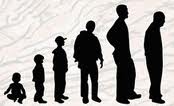By Persephone…..
(This piece was sent to me by a member of this blog community, and I think it’s incredibly astute and revealing. As a developmental psychologist, I strongly agree that the recovery process should be viewed as developmental, not static. P.S. It’s apparently no longer be-nice-to-12-step week.)
 After I had been clean for what one member counted as 17 months, I finally went back to an NA meeting, only to discover that there is such a thing as being held in stasis in recovery — and that I had, myself, been there. I was acutely aware before, but even more by that point, that for many of my 12 step instructors (for lack of a better word) we were supposed to freeze ourselves in that very moment in which we finally realized that we were “diseased” and had decided to devote ourselves to recovery. We were to cling to that moment in time, reaching backwards instead of forward, into the depths of our misery lest we forget it, developing emotionally only artificially via these 12 steps but otherwise staying rather static in some very crucial ways. So, I watched as roughly 30 people recounted, and with the same stories I had observed over 17 months prior, the worst moments of their addiction. Having not been in a 12 step program since getting clean, but rather in trauma therapy (when I had any therapy at all) as well as restructuring my life on my own based around my new-found loves of self-restraint and goal oriented thinking (not to mention just plain having fun), I could only see in these shares shadows of my past. My very sick past, and one in which I was unable to achieve any kind of “recovery”. I could also see exactly what my therapist always warned as dangerous in terms of staying in the moment and forcing oneself to relive past traumas, though my new and healthy brain had already directed me against this sort of thinking. Very far away from this kind of thinking, so why was this not the case in the most well-known substance abuse venue in the western world?
After I had been clean for what one member counted as 17 months, I finally went back to an NA meeting, only to discover that there is such a thing as being held in stasis in recovery — and that I had, myself, been there. I was acutely aware before, but even more by that point, that for many of my 12 step instructors (for lack of a better word) we were supposed to freeze ourselves in that very moment in which we finally realized that we were “diseased” and had decided to devote ourselves to recovery. We were to cling to that moment in time, reaching backwards instead of forward, into the depths of our misery lest we forget it, developing emotionally only artificially via these 12 steps but otherwise staying rather static in some very crucial ways. So, I watched as roughly 30 people recounted, and with the same stories I had observed over 17 months prior, the worst moments of their addiction. Having not been in a 12 step program since getting clean, but rather in trauma therapy (when I had any therapy at all) as well as restructuring my life on my own based around my new-found loves of self-restraint and goal oriented thinking (not to mention just plain having fun), I could only see in these shares shadows of my past. My very sick past, and one in which I was unable to achieve any kind of “recovery”. I could also see exactly what my therapist always warned as dangerous in terms of staying in the moment and forcing oneself to relive past traumas, though my new and healthy brain had already directed me against this sort of thinking. Very far away from this kind of thinking, so why was this not the case in the most well-known substance abuse venue in the western world?
I realized while listening to these shares (over 30) that none of this emotional development had taken place with the members of this particular group. Hopelessness, anxiety, and the common thread that the “disease” was still very present (and quite personified, doing push-ups in the parking lot and lurking around every corner just waiting to flare back into active addiction), even in the relatively normal actions and thoughts these people had experienced that day. They were still experiencing the anxieties and fears I by then had come to associate only with active addiction and very,  very early sobriety. Not being trained in psychology but having had my fair share of trauma counseling and the usual smattering of readings about trauma and abuse, I also associated these problems as being almost akin to PTSD, which is almost by definition a state of stasis in which one cannot process or heal from a traumatic experience.
very early sobriety. Not being trained in psychology but having had my fair share of trauma counseling and the usual smattering of readings about trauma and abuse, I also associated these problems as being almost akin to PTSD, which is almost by definition a state of stasis in which one cannot process or heal from a traumatic experience.
Yet even in my tattered memory, I was acutely aware of what I was taught during my short tenure in NA and the inevitable stint in a 12 step rehab that followed (I say this not to offend adherents to the 12 step method, but to stress that the effect this static-not-developmental treatment had on me was to, well, keep me in my addiction — which for me was synonymous with hopelessness and trauma.). I, and the others, were told that we must essentially live with clipped wings. If we were allowed to ever truly fly, we’d surely be conquered by our own “self-will” and excesses of ego. Anger and hatred (“resentments”, in 12 step parlance) were to be eradicated. How we were supposed to do this without extreme amounts of repression (or a particularly intense spiritual experience) was rather beyond me, and frankly it was my anger that was keeping me going. I consider anger now a useful stage of sorts in my  development as a now-recovered person, much like the anger in the often quoted stages of grieving. But no, never in “recovery”. “Resentments” lead to relapse, we were taught. We were to progress only through the steps, despite our various ideological differences with them, but never through normal human emotions. We were all taught that we were faulty, that our brains were faulty from birth, that we were born addicts and must consider our brains to be diseased until the day we died.
development as a now-recovered person, much like the anger in the often quoted stages of grieving. But no, never in “recovery”. “Resentments” lead to relapse, we were taught. We were to progress only through the steps, despite our various ideological differences with them, but never through normal human emotions. We were all taught that we were faulty, that our brains were faulty from birth, that we were born addicts and must consider our brains to be diseased until the day we died.
Stasis.
Conversely, we were supposed to also ruminate endlessly on our own thoughts (which for me is an excess of ego I don’t prefer to allow!) and stay in the exact same mode of instant gratification that we were in as active addicts and alcoholics (or both). This, in retrospect, is what I find almost the most damaging. There is no emotional development possible, at least not for me, if I’m to still be obsessively thinking about, well, my own obsessive thoughts! Certainly not if my response to a thought I find possibly “diseased” is absolutely and immediately to call my sponsor and then promptly get to a meeting — it’s still instant gratification. This is the same model of living I (and other addicts/alcoholics) had experienced while using and drinking, living from moment to moment with our thoughts focused on getting a substance into our bodies — NOW!! — and getting that instant gratification of a high, a buzz, whatever you choose to call it. In my meetings and rehab, it was still the same, just an instant gratification based on an anxiety-centered thought process. How this would bring me, personally, to “serenity” was rather beyond me. Perhaps the idea was to confuse me to sobriety?
Why not encourage patterns of thinking that don’t simply state that you must get to the serenity point (while remaining in a process in which every thought must be immediately pounced  upon and discussed — instant gratification) but instead encourage goal-oriented thinking? I understand that this is hard for the “newcomer” to grasp, but after a few months (at most), introducing at least some ideas beyond the over-arching one of staying in sobriety might be at least somewhat helpful! Acceptance (“live life on life’s terms”) was also to be implemented immediately, not arrived at by experiencing other basic human emotions relating to our situations, such as anger, not even the bargaining listed in the well known grief list. Of everything, what I view as most valuable is that people must process their emotions, even the ones not deemed acceptable (acceptance!) by the creators of Alcoholics Anonymous. That people must learn, and that they must develop. That sometimes true acceptance is the ability to finally move on and leave behind the stasis caused by endlessly repeating stories of the lowest lows.
upon and discussed — instant gratification) but instead encourage goal-oriented thinking? I understand that this is hard for the “newcomer” to grasp, but after a few months (at most), introducing at least some ideas beyond the over-arching one of staying in sobriety might be at least somewhat helpful! Acceptance (“live life on life’s terms”) was also to be implemented immediately, not arrived at by experiencing other basic human emotions relating to our situations, such as anger, not even the bargaining listed in the well known grief list. Of everything, what I view as most valuable is that people must process their emotions, even the ones not deemed acceptable (acceptance!) by the creators of Alcoholics Anonymous. That people must learn, and that they must develop. That sometimes true acceptance is the ability to finally move on and leave behind the stasis caused by endlessly repeating stories of the lowest lows.
I could at that meeting, and now at past the two year mark of getting clean, see quite clearly that the anxiety and obsessive thoughts I was experiencing at the time were a result of the opiates I was addicted to and the fear of withdrawing from them. For me, and no doubt many others (and I have now met a great many others like myself who have recovered — again, past tense), the removal of the substance and consequent healing of the brain were what did the trick. For me, remaining constantly frightened and anxious would have retarded any personal development, but would’ve been reinforced by the 12 step system had I stayed involved with it. And I see that most clearly when I look at my life now as being so different from the many lives still stuck at a static point — a static point in what should be a process of emotional development — or at the very least the foundation for a new beginning.

Leave a Reply